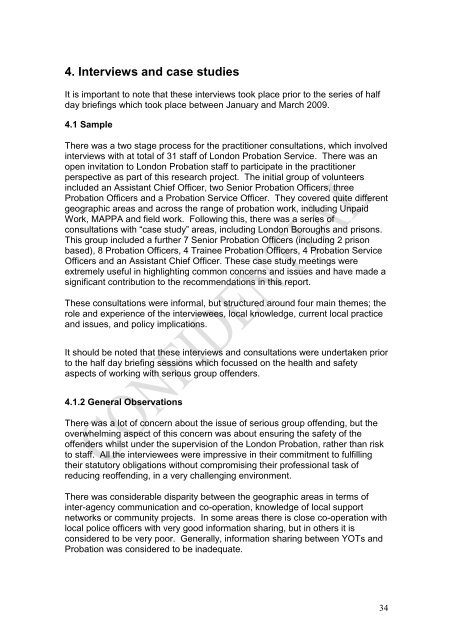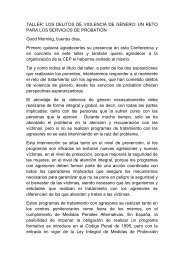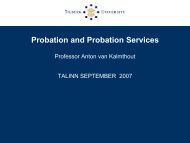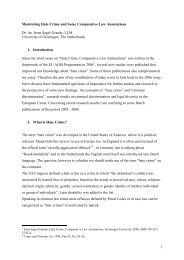Offender Management Community Scoping of London Gang ...
Offender Management Community Scoping of London Gang ...
Offender Management Community Scoping of London Gang ...
You also want an ePaper? Increase the reach of your titles
YUMPU automatically turns print PDFs into web optimized ePapers that Google loves.
4. Interviews and case studies<br />
It is important to note that these interviews took place prior to the series <strong>of</strong> half<br />
day briefings which took place between January and March 2009.<br />
4.1 Sample<br />
There was a two stage process for the practitioner consultations, which involved<br />
interviews with at total <strong>of</strong> 31 staff <strong>of</strong> <strong>London</strong> Probation Service. There was an<br />
open invitation to <strong>London</strong> Probation staff to participate in the practitioner<br />
perspective as part <strong>of</strong> this research project. The initial group <strong>of</strong> volunteers<br />
included an Assistant Chief Officer, two Senior Probation Officers, three<br />
Probation Officers and a Probation Service Officer. They covered quite different<br />
geographic areas and across the range <strong>of</strong> probation work, including Unpaid<br />
Work, MAPPA and field work. Following this, there was a series <strong>of</strong><br />
consultations with “case study” areas, including <strong>London</strong> Boroughs and prisons.<br />
This group included a further 7 Senior Probation Officers (including 2 prison<br />
based), 8 Probation Officers, 4 Trainee Probation Officers, 4 Probation Service<br />
Officers and an Assistant Chief Officer. These case study meetings were<br />
extremely useful in highlighting common concerns and issues and have made a<br />
significant contribution to the recommendations in this report.<br />
These consultations were informal, but structured around four main themes; the<br />
role and experience <strong>of</strong> the interviewees, local knowledge, current local practice<br />
and issues, and policy implications.<br />
It should be noted that these interviews and consultations were undertaken prior<br />
to the half day briefing sessions which focussed on the health and safety<br />
aspects <strong>of</strong> working with serious group <strong>of</strong>fenders.<br />
4.1.2 General Observations<br />
There was a lot <strong>of</strong> concern about the issue <strong>of</strong> serious group <strong>of</strong>fending, but the<br />
overwhelming aspect <strong>of</strong> this concern was about ensuring the safety <strong>of</strong> the<br />
<strong>of</strong>fenders whilst under the supervision <strong>of</strong> the <strong>London</strong> Probation, rather than risk<br />
to staff. All the interviewees were impressive in their commitment to fulfilling<br />
their statutory obligations without compromising their pr<strong>of</strong>essional task <strong>of</strong><br />
reducing re<strong>of</strong>fending, in a very challenging environment.<br />
There was considerable disparity between the geographic areas in terms <strong>of</strong><br />
inter-agency communication and co-operation, knowledge <strong>of</strong> local support<br />
networks or community projects. In some areas there is close co-operation with<br />
local police <strong>of</strong>ficers with very good information sharing, but in others it is<br />
considered to be very poor. Generally, information sharing between YOTs and<br />
Probation was considered to be inadequate.<br />
34




![AGIS2 Nov 08 Conference Report_[Version 2] - CEP, the European ...](https://img.yumpu.com/50764570/1/190x245/agis2-nov-08-conference-report-version-2-cep-the-european-.jpg?quality=85)











